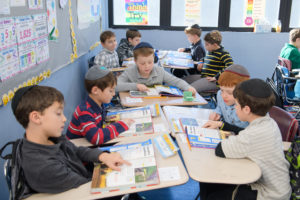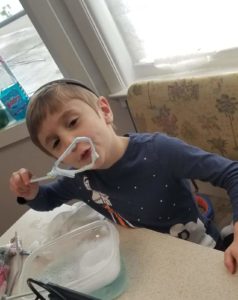 A Behind the Scenes look at Opening Up School Again with Rabbi Mordechai Kamenetzky, Rosh Yeshiva
A Behind the Scenes look at Opening Up School Again with Rabbi Mordechai Kamenetzky, Rosh Yeshiva

School. The word conjures productivity, growth – and the safety of an environment focused on students’ benefit. But what happens when that safety is called into question? In this volatile era, what can and must be done to ensure that students can learn under optimal conditions, without compromising their health – or happiness? Join us in conversation with Rabbi Mordechai Kamenetzky, Rosh Yeshiva of Yeshiva of South Shore as he expounds on the challenges and specifics of schools’ reopening for the coming school year.
Q: What are the main challenges facing schools as they plan for their reopening?
A: The challenge here is twofold. We need to be able to educate our children in a safe space – that is the priority. And safe means safe for the children themselves, for their Rebbeim and teachers, and for anyone they come in contact with. But there’s another aspect which is arguably just as important. We need to make sure the vigilance, vital as it may be, doesn’t cause unwarranted fear or anxiety in children who have already heard and seen too much.
The goal is straightforward, but the workload is staggering.
The administrative staff members of our schools have been meeting, discussing, and planning for months. They carefully weigh each variable, determining a plan of action that satisfies both their vision for a safe reopening, and the intense standards mandated by the state.
What you believe is okay may not be acceptable by government standards. There is strong oversight on public gatherings in Nassau County, and schools are included in those restrictions. We need to abide by the rules of the regulating agencies and reconcile that with the best choices for our Yeshiva.
Q: What does this entail on a practical level? 
A: The first step is a spotless school building. Schools must also install adequate hand sanitizing stations and enforce their usage. Additionally, students must be divided into cohorts smaller than the regular class sizes, and each “bubble” must remain relatively separate from the others. Physical barriers must be installed in each classroom, at the teacher’s desk as well as each student’s desk.
We also are equipping each classroom with video capabilities to accommodate students who are immunocompromised and can’t physically attend school, to prepare for the eventuality of any interruption of regular in-person studies.
Any diminishment of regular conditions in school naturally affects the morale. Students the world over have been pining for the attention, social interaction, and friendship that only physical proximity can afford, after too many months spent lacking it. But even once we open, there’s a strong chance that a lot of this interaction will be limited. We likely won’t be holding regular assemblies, lab classes may need to be cancelled, and inter-class extra-curricular activities will be curtailed.
Yeshiva of South Shore is known for its warmth and positivity, but it’s been a challenge to maintain that in the virtual classroom.
One of our Rebbeim mentioned that he noticed a student looked bothered during a Zoom class. Whereas he usually would have called the student over to his desk immediately and addressed the issue, during Corona he needed to wait until after class and call the student on the telephone. Over time, these hurdles can affect students on so many levels.”
These students are experiencing an era that’s traumatic even for adults. Many have been impacted by the deaths of relatives or friends, and some of their own teachers have been hospitalized. Hence the aforementioned double charge of schools: Open safely, but without fear.
Q: How can parents serve as active partners in this crucial period?
A: Firstly, be vigilant – and honest. If a child doesn’t feel well, especially with possible Covid symptoms, keep them home at all costs, and test them. Over the years, we have encountered instances where parents had to get to work, and would send somewhat ill children to school, hoping for the best. But in times like this, that’s much riskier.
The second thing parents can do is to partner with the school on a financial level. Unless you’re in the thick of things, it’s hard to imagine how much such an endeavor can cost a school. We’ve been provided with a certain amount of PPE by FEMA, but that doesn’t cover the barriers, the hand sanitizer stations, and the tremendous amount of additional resources necessary. Schools will also be hiring many new staff members to accommodate the smaller class sizes, as well as other staff to assist in the transition. I’d estimate the Covid-related reopening costs at half a million dollars.
Aside from the additional costs, there is the severe decrease in tuition and donations. We have parents who can’t get back to work, or whose businesses suffered to the point that they simply cannot meet their obligations. Everyone understands that schools have an obligation and a desire to educate their children regardless of financial ability, but this places a stronger onus on community members who do have the ability to help out.
Yeshiva of South Shore currently occupies one of the oldest school buildings in the area. When the pandemic broke out, we were in the early stages of a rebuilding campaign that would enable us to function in a pleasant and proper setting. That came to a halt, but our renovations cannot. We need the proper technology installed to be able to educate every single child.

Yeshiva of South Shore currently occupies one of the oldest school buildings in the area. When the pandemic broke out, we were in the early stages of a rebuilding campaign that would enable us to function in a spacious and state of the art facility. The campaign slowed during Covid, but the modifications that we need right now, cannot. We need the proper technology and safety measures installed to be able to educate every single child safely.
Q: What is your closing message to the community at this time?
A: From March through June there was a big worry about our Shuls. Now, we need to shift our focus to our schools. People are inclined to assume that schools will somehow step up and be okay, but in truth, it is incumbent upon every community member to step up to the plate and assist in any way he or she can.
Every Jewish community is marked by Chessed organizations that provide food and other assistance to those in need. Education may be a less tangible need, but no less concrete or vital. Doing our part is no longer optional – it is the essence of our children’s future.
Yeshiva of South Shore has just successfully completed a $501k Campaign. The funding will enable us to provide a safe, successful school, which includes a scholarship fund, health and safety upgrades, technology upgrades, additional staffing and much more.We joined together and invested in a strong future for our children. Together, let’s give our children the best year ever!